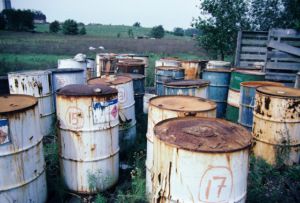News
Hundreds of barrels of poison could be hidden in northern Denmark
This article is more than 8 years old.
Retired driver says there could be hundreds of barrels buried at two different sites

Old barrels of chemicals could be poisoning groundwater (photo: R. Slerrab)
Several hundred barrels of poisonous chemicals have allegedly been buried at two sites close to groundwater in northern Zealand.
Mogens Bredahl Christiansen, a retired driver, told investigators from Danish broadcaster P1 that when he was working as a driver for a landscaping company in the early 1970s, he often transported drums of waste for the Lars Voss Chemical Company.
“I don’t know if it was 25 or 30 barrels,” said Christiansen. “They were dumped in water and then covered over again with dirt.”
Buried a long time ago
Christiansen said he saw workers at a local gravel pit burying barrels below the water level at Kejserdal on an early Saturday morning in the summer of 1974.
He recognised the barrels from the nearby Højsager landfill, where he had on many occasions observed 30-40 barrels at a time being dumped over a period of several years, creating the potential for hundreds of barrels of poison being hidden.
Region Hovedstaden, the capital region, which is responsible for contamination cases, confirmed that Christiansen’s information was correct.
New tests needed
The region suspects the barrels contain the chlorinated solvent TCA, which is dangerous to animals and humans if ingested. TCA was previously found in abundance in and around a chemical factory in nearby Fredensborg, where the land had to be decontaminated.
It has been 12 years since the groundwater was investigated near Kejserdal, and 22 years ago since samples were taken at Højsager. Those samples showed no sign of contamination.
Could be leaking
A professor emeritus and chemist, Finn Bro Rasmussen, worries the barrels may be leaking.
“The danger is that the drums will gradually erode,” said Rasmussen. “The contents could leak and pollute the groundwater, which is the basis for our drinking water. They should be checked regularly.”
READ MORE: Forgotten landfills are polluting nation’s waterways
The region will take a sample of groundwater near Højsager within a few weeks, and the results are expected within a month.










































